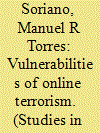| Srl | Item |
| 1 |
ID:
094844


|
|
|
|
|
| Publication |
2010.
|
| Summary/Abstract |
Given the growth of Internet research in recent years, it is rather surprising that research of online terrorism and countermeasures has been lacking theoretical and conceptual frameworks. The present study suggests applying the concepts and models taken from e-marketing to the study of terrorist websites. This work proves that when Hamas builds an array of sites in the Internet, it complies with the same rules that the Western business world follows. Chaffey et al. (2000) constructed a model comprised of eight decision points in the process of building a business-oriented Internet site. Although the model was developed for commercial purposes, the present study demonstrates how it could be used as an analytic framework to study terrorist websites. As shown, most of the decision points in the model were relevant to the Palestinian Information Center group of websites. Understanding the e-marketing strategy of Hamas will allow the construction of a competing marketing strategy in order to market rival ideological consumer products.
|
|
|
|
|
|
|
|
|
|
|
|
|
|
|
|
| 2 |
ID:
112608


|
|
|
|
|
| Publication |
2012.
|
| Summary/Abstract |
Jihadist terrorism has discovered in the Internet a valuable instrument to strengthen its activities. However, in using this technology the terrorists are exposed to new vulnerabilities. The Internet plays a leveling role: each new advantageous use it brings is accompanied by a new opportunity to weaken terrorist groups. The present article examines the main vulnerabilities of radical groups who have accorded the Internet a central role in their strategy, namely, less anonymity and security, a loss of content visibility, a major credibility problem, and an undermining of the legitimacy of the terrorist discourse as a consequence of their use of Web 2.0.
|
|
|
|
|
|
|
|
|
|
|
|
|
|
|
|
| 3 |
ID:
186052


|
|
|
|
|
| Summary/Abstract |
What began as the 1972 Munich Olympic Games quickly became a global media event, a live broadcast of a deadly terrorist attack that changed the future of modern terrorism. Broadcast to an audience of over 900 million, the event was a game changer that changed the relationships within the triangle terrorism-media-public. The ‘new’ terrorism, following the Munich massacre, has adapted the new rules of the game, the rules of media-oriented actions. Media-oriented terrorism is the use of pre-planned attacks that are wittingly designed to get media attention and coverage and consequently to reach the general public and decision makers. This article presents two powerful concepts in communication and terrorism paradigm that emerged from this tragic event: the notion of The Theatre of Terror and the notion of Coercive Media Events. Finally, it examines post-Munich trends and especially how terrorists’ migration to social media and online platforms has preserved and refined their lessons from the Munich attack.
|
|
|
|
|
|
|
|
|
|
|
|
|
|
|
|